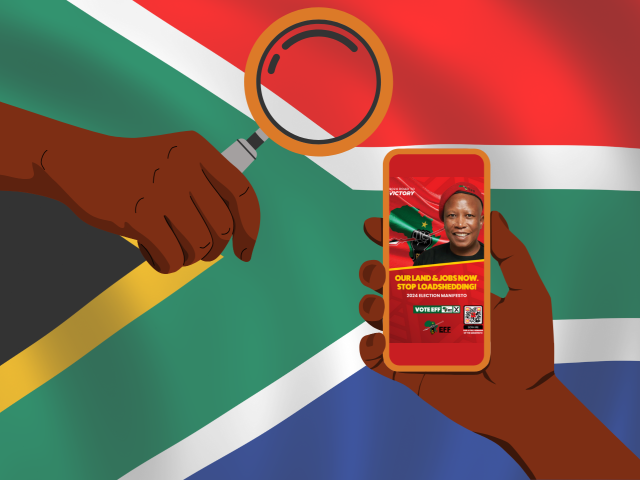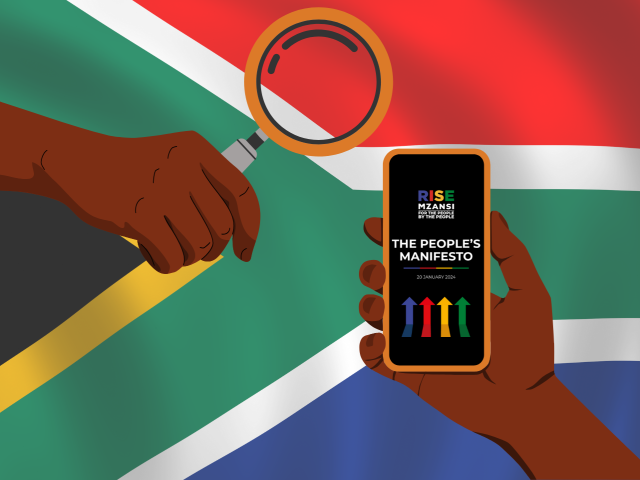A video circulating on social media claims that South Africans will soon have “zero right to self-defence” from home invaders, should proposed changes to the country’s trespassing law come into effect.
The video, posted to TikTok, seems to have been removed from the original poster’s account. But other instances of the video have since been shared on TikTok, here and here, and Facebook. Several Africa Check readers forwarded it to our Whatsapp line.
In the video, a woman describes a hypothetical situation where intruders breach your security, enter your home, and attack your family.
The woman claims that if the bill is passed into law, in a home invasion situation like this, the homeowner would not legally be able to defend themselves. “Your only duty is to inform the intruders that they are intruding and if you feel threatened you must … inform the [South African Police Service],” she says.
But would a new bill really take away South Africans’ right to defend themselves from attackers in their homes? We checked.
New bill replaces colonial-era law
The Unlawful Entry on Premises Bill was released for public comment by the Department of Justice and Constitutional Development (DOJ) in August 2022. Should it be passed into law, it will replace the current Trespass Act of 1959.
According to the DOJ, the Trespass Act is a colonial-era law that created “hostility between certain population groups”. The minister of justice and correctional services Ronald Lamola explained the history of the act in a video posted to social media in response to the viral TikTok video. He said it had been passed by the queen of England when South Africa was still a union, in 1959, and was outdated.
“The trespassing act … has lost its relevance in our constitutional democracy,” he said.
The department of justice says the new bill will “give the owner or lawful occupier more protection than they had before”.
According to both the draft bill and Lamola, while the previous act only protected some kinds of premises, the new bill would allow other kinds of property to be protected, including ships, aircraft and vehicles.
Draft bill does not make it easier for persons to commit crimes
This explanation from the DOJ is at odds with the views expressed in the viral TikTok video. As evidence for the claim that homeowners would not legally be able to defend themselves under the proposed law, the woman in the video reads from the draft bill: “It is a defence … that the person charged reasonably believed that they had title to or an interest in the premises that entitled them to enter the premises.”
This has been interpreted to mean that anyone wanting to enter a property can do so legally, if they believe they have a right to do so.
“If somebody likes the smell of your boerewors on the braai, they have a right to come inside your home because they are entitled and the proposed law says so,” the video claims.
But here trespassing is being confused with crimes like theft, housebreaking and robbery. The justice department was quick to say that these crimes “remain the same offences as they always were”.
“The bill does not change those offences or make it easier for persons to commit crimes,” it said.
The department said that under the bill someone entering a home or other premises without a “lawful reason” was guilty of a criminal offence. Wanting to steal food or attack someone’s family did not count as a lawful reason, it clarified.
The home invasion described in the video would not be dealt with under the trespassing law, but rather as a theft, robbery or other relevant offence.
Right to self-defence entrenched in South African law
Africa Check spoke to William Booth, a criminal law attorney at William Booth Attorneys in Cape Town. He confirmed that the bill “does not take away a citizen’s rights to protect themselves or their property”.
The right to self-defence was entrenched in South African law, he said.
“The right to defend yourself, your family, a third person, or your property who is being attacked or where there is an imminent attack, is certainly not affected at all by the draft bill … the comments made specifically relating to self-defence are completely inaccurate.”
In the response video, minister Lamola debunked what was said in the original video. After taking a bite of the boerewors roll in his hand, he reiterated the department’s statement, saying that the new bill still enabled people to defend themselves.
“The right of self-defence remains as provided for in various statutes and also under the common law,” the minister said.
This meant that someone could perform the same reasonable actions in self-defence as before, should they find themselves in a situation like the one described in the video.
These actions should not be more harmful than absolutely necessary to stop an attack. This is called proportionality, the concept that the defence be in proportion to the attack.
(Note: For more information about the right to self-defence, see this explainer from South African Rauch Gertenbach Attorneys.)








Add new comment